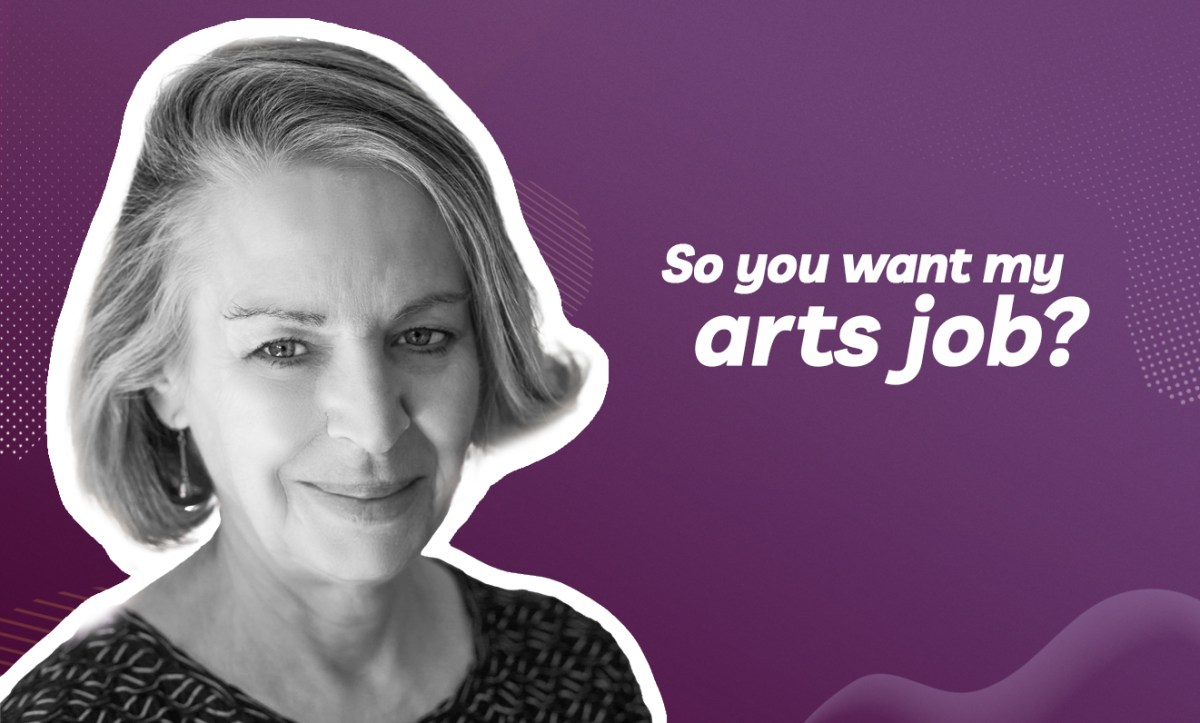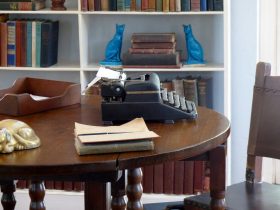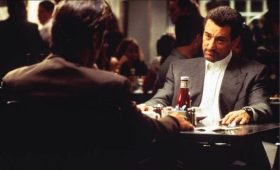Jump to:
Dr Susan McLaine is the creative director of Bibliotherapy Australia and a leading advocate, practitioner and trainer of bibliotherapy – using literature and storytelling to support well-being. For more than 18 years, she has researched, delivered, written and spoken about bibliotherapy in Australia and internationally.
McLaine offers bibliotherapy in a facilitated self-reflective format for adults and children via innovative bibliotherapy podcasts for State Library Victoria, BUPA and Vision Australia, which have been described by The Guardian as the closest thing to a hug. She travels widely with her unique “Heart-Centred Bibliotherapy” model Building Bibliotherapy Skills.
Taking time out of her busy schedule, she tells ArtsHub a little more about what her job entails.
Can you explain what a bibliotherapist does?
Bibliotherapy has evolved in a variety of professions and is interdisciplinary in nature. Within the various disciplines, across both clinical and non-clinical areas, professionals working with bibliotherapy use a variety of literature within different therapeutic applications depending on the field of practice.
The way I work with bibliotherapy is to choose a story, poem or poetic non-fiction and some questions, weave them together, and read them aloud. Then, I guide participants into exploring the themes and thoughts that present themselves. When bibliotherapy is delivered through reading aloud, it can awaken the delight of literature in the spoken word, in the aural tradition of storytelling.
These curated bibliotherapy sessions occur within a community setting, either as an in-person, collaborative group model or a facilitated self-reflective podcast. Bibliotherapy can produce “reverie”, defined ‘as a state of mind that enables contemplation, imagination and creativity’. Reverie can have therapeutic and healing effects through connecting with our inner world to enrich our relationship with others and ourselves.
A participant described my curated bibliotherapy experience as: ‘Meditation and mindfulness for readers, allowing literature lovers to seek solace, comfort and answers by exposing thoughts, feelings and behaviours to closer examination. It opens access to the works of authors, poets and philosophers that give us essential information about the world and our relationship to it and to ourselves.’
What I have found is that you don’t have to be a reader to benefit from bibliotherapy. It involves a creative process through accessing imagination to improve and enhance well-being, whether reading is enjoyed or not. It moves people effortlessly from mindless conversation to meaningful conversation. It can help a sense of belonging to emerge, as it offers a way to be with other people without the expectation of interacting, and a way to quietly be with yourself.
How did you first become started in this rather niche job?
I love learning. In 2005, after completing a Bachelor of Literary Studies as a mature-age student I went on to complete an Honours degree on bibliotherapy. Since then, I have researched, delivered, written and spoken about bibliotherapy in Australia and internationally, and completed a doctorate on the subject. I have led two long-term bibliotherapy groups for people who have been homeless and in the psycho-social unit at Victoria’s maximum-security prison. I have delivered bibliotherapy in areas where people thought it wouldn’t make a difference and proved it made a great deal of difference. I want to keep making a difference.
What are some of the misconceptions about it?
Similarly to other arts-based therapies, the intended outcome is the exploration of feelings and improved self-awareness, which are facilitated using the art form as the primary tool. Bibliotherapy is in fact an ancient practice and has been around far longer than most arts-based therapies, but as many people practising bibliotherapy don’t call it that, it remains a little-known or understood term.
Bibliotherapy is often thought of as a type of book club. A book club usually holds the expectation of having read the book before the session. In bibliotherapy, participants may hear a story for the first time. Bibliotherapy goes beyond a book club’s analysis and general discussion, offering a more reflective and singular experience. In bibliotherapy, the participants are encouraged and given the space to respond emotionally.
The intention of bibliotherapy differs from a book club in that the bibliotherapist chooses the literary text for the situation, experience or characters it presents, and curates the session to help bring about the possibility of new insights and a shift in perspective for the participants.
Do you have to have any special training to be a bibliotherapist?
Various training is required depending on the therapeutic application and the practice field. To be a community-based bibliotherapist, you must apply practical and theoretical skills and knowledge in literature and therapy. These include literature-based skills of understanding literature as a well-being tool, selecting literary texts to engage specific participants, and bringing the literature to life when reading aloud. As well as skills in working with groups and facilitating well-being focused and meaning-making conversations. Rather than needing a clinical background to provide community-based bibliotherapy effectively, bibliotherapists need an awareness of therapeutic conditions, the ability to offer them and knowledge of working with emotions.
From my extensive experience in this area, I have seen what works, and have developed a new training model for bibliotherapy, which became the Heart-Centred Bibliotherapy model. The Building Bibliotherapy Skills course I teach explicitly addresses the individual “biblio” and “therapy” aspects to develop an understanding of the therapeutic intention and techniques in community-based bibliotherapy.
If you were hiring a bibliotherapist, what qualities would you look for?
Delivering bibliotherapy effectively is connected to personal attributes. So, I look for someone with some, or all, of the essential personal attributes of a person who would be a good fit for being a bibliotherapist. The essential personal attributes include being caring and compassionate, having well-developed listening skills, being accepting and welcoming, valuing the presence of others, being non-judgemental and being free from expectations.
These attributes are not hard skills to acquire, but are attitudes of the facilitator and are often intuitive. They are connected to our capacity to be with people and how we value others, and must be genuine.
Although I don’t hire bibliotherapists, I do look for these qualities in those who approach me for training. Heart-based training helps cultivate these attributes.
Read: So you want my arts job: Drama Therapist
What does your daily routine look like?
My daily routine involves me having my nose in a book, which is a bit of bibliosmia (love the smell of books) as I collect resources and develop training for my unique Heart-Centred Bibliotherapy model.
I feel very blessed to have the magic of bibliotherapy right under my nose. Each day, I appreciate stories that have nourished us as I look for new stories that I can help fly off the page and into our life, where these pages of a good book can provide a foundation to respond to people’s well-being needs.





